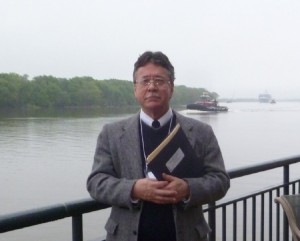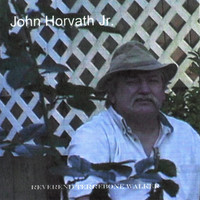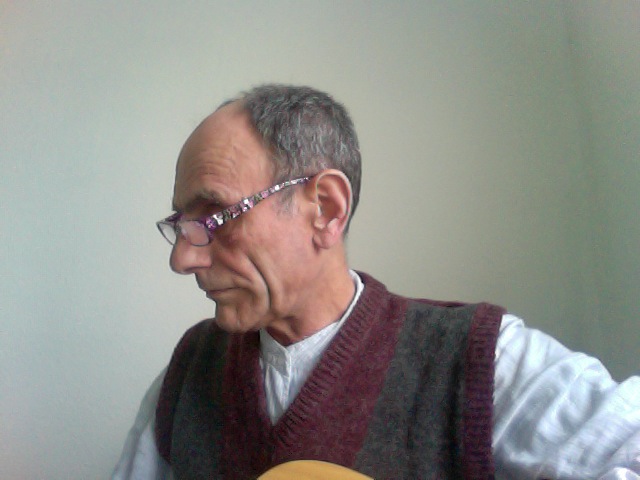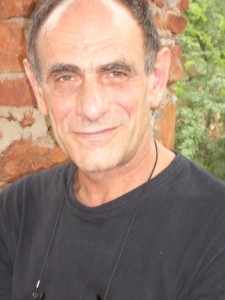http://youtu.be/fv52Adoh_GE
***
¿Y si fuera otra la ciudad,
“apenas vaho sobre el cristal”,
apenas un puñado de azogue sobre el vidrio?
Pero entender es extranjero;
tienes que dar un paso a tu costado,
abandonar el familiar aliento:
ese que teje con su alma de humo
el calendario absorto de los días;
el que hilvana en la sombra del horizonte
la pupila del tiempo;
el que sostiene,
con alfileres de arena entre los dedos,
los muros de la infancia,
las calles que ya no son, las horas
que ya se fueron,
los escombrados descampados que ahora son penumbra en el mostrador
Sin embargo, tú sigues viendo
el horizonte con su sombra
allí donde hoy hay un garaje.
Entre llaves y llantas,
entre motores y carrocerías
entre este mono azul y el suelo gris
aún huyen por las piedras los lagartos,
aún deja el caracol su rastro en la escombrera.
Florecen los almendros,
los trigales se elevan:
regresas con un olor a cardo y cicatriz,
vaho de miel,
apenas fragmentos de un azogue
ardidos en la hoguera.
La puerta del garaje se ha quedado abierta:
te asomas absorta a tu costado,
te quedas ahí, quieta, “respirando el verano”,
recordando,
respirando, recordando
la canícula secreta,
olvidando, mirando, quieta:
resbala una libélula
entre manos grasientas,
cae una tuerca,
cantan
¿quién canta?
llaves, llantas, ruedas
y unos niños que saltan
al estupor de piedra en piedra.
Correr sin caerse entre los escombros.
Correr deprisa, muy deprisa,
saltar, correr, cantar,
correr
antes de que todo desaparezca,
antes de que se acabe el verano,
antes de que ya solo quede
este garaje,
este vaho, este cristal,
este hombre rodeado de llaves,
aceites, llantas, tuercas,
piezas del velatorio de tu infancia.
Qué tarde se ha hecho:
aunque hemos sorteado los escombros,
cruzado los almendros, atravesado el trigal,
aunque estamos sudorosos y sin aliento,
la ciudad ha llegado antes,
ha llegado más lejos,
más deprisa, más dónde:
apenas un hilo sobre el cristal,
un puñado de azogue sobre el vidrio.
Es otra la ciudad
y entender es extranjero.
***
Madrid, 1973
And if the city was otherwise,
“just haze on crystal”.
just a handful of quicksilver on the glass?
But understanding is alien;
you need to step beside your side,
abandon the familiar breath:
the one that with its soul of smoke
knits the absorbed calendar days;
the one that threads the horizon´s shadow
through the pupil of time;
the one that holds
with pin heads of sand between its fingers
the walls of childhood,
the streets that are no more, the hours
already gone,
the dumping tips that are now twilight on the countertop.
Yet still you continue to see
the horizon with its shadow
where today a garage stands.
Between spanners and tyres,
between motors and bodyworks,
between a blue boiler suit and a grey floor
where lizards still dart amongst the stones,
where a snail still leaves its trail on the dump.
Almond trees flourish,
wheat fields rise up:
you return with a smell of thistle and scratches,
honey dew,
just fragments of quicksilver
burnt at the bonfire.
The garage door has remained open:
absorbed you peer into your side,
you remain there, still, “breathing the summer”,
remembering,
breathing, remembering
the secret midsummer heat
Forgetting, looking, still:
a dragonfly glides
between greasy hands,
a screw drops,
they sing,
who sings?
spanners, tyres, wheels
and children hop scotching
amazement from stone to stone.
Run without stumbling over the rubble.
Run fast, very fast,
skip, run, sing,
run
before everything vanishes,
before summer is over,
before only
this garage
this haze, this glass
remain,
this man surrounded by spanners,
oils, tyres, screws,
pieces of your childhood´s wake.
How late it´s grown:
even though we´ve avoided the dump,
crossed by the almond trees, passed through the wheat field,
even though we are sweaty and breathless,
the city has arrived before,
has arrived more far,
more quick, more where:
just a thread on the crystal,
a handful of quicksilver on the glass.
The city is otherwise
and understanding is alien.
***
Original Translation Amparo Arrospide & Robin Ouzman Hislop
***

Guadalupe Grande was born in Madrid in 1965. She has a Bachelor degree in Social Anthropology. Published poetry books: El libro de Lilit, (Renacimiento, awarded the 1995 Rafael Alberti Award, 1995), La llave de niebla (Calambur, 2003), Mapas de cera (Poesía Circulante, Málaga, 2006 and La torre degli Arabeschi, Milán, 2009), Hotel para erizos (Calambur, 2010) and Métier de crhysalide (an anthology, translated by Drothèe Suarez y Juliette Gheerbrant, Alidades, Évian-les-Bains, 2010).
As a literary critic, she has published in cultural journals and magazines, such as El Mundo, El Independiente, Cuadernos Hispanoamericanos, El Urogallo, Reseña and others.
In 2008 she was awarded the Valle Inclán grant for literary creation in the Academia de España in Rome.
In the publishing and cultural management areas, she has worked in institutions such as the Complutense University of Madrid Summer Courses, Casa de América and Teatro Real. Currently she manages poetical activities in the José Hierro Popular University at San Sebastian de los Reyes, Madrid.
The poems “Ocho y media” (Half past eight) and “Madrid, 1973” belong to La llave de niebla, and have been translated into English by Robin Ouzman Hislop and Amparo Arróspide.
***
Guadalupe Grande nació en Madrid en 1965. Es licenciada en Antropología Social.
Ha publicado los libros de poesía El libro de Lilit, (Renacimiento, Premio Rafael Alberti 1995), La llave de niebla (Calambur, 2003), Mapas de cera (Poesía Circulante, Málaga, 2006 y La torre degli Arabeschi, Milán, 2009), Hotel para erizos (Calambur, 2010) y Métier de crhysalide (antología en traducción de Drothèe Suarez y Juliette Gheerbrant, Alidades, Évian-les-Bains, 2010).
Como crítico literario, ha colaborado en diversos diarios y revistas culturales, como El Mundo, El Independiente, Cuadernos Hispanoamericanos, El Urogallo, Reseña, etcétera.
En el año 2008 obtuvo la Beca Valle Inclán para la creación literaria en la Academia de España en Roma.
En el ámbito de la edición y la gestión cultural ha trabajado en diversas instituciones como los Cursos de Verano de la Universidad Complutense de Madrid, la Casa de América y el Teatro Real. En la actualidad es responsable de la actividad poética de la Universidad Popular José Hierro, San Sebastián de los Reyes, Madrid.
Los poemas “Ocho y media” y “Madrid, 1973” pertenecen a La llave de niebla y han sido traducidos al inglés por Robin Ouzman Hislop y Amparo Arróspide.
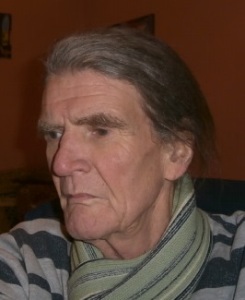
Robin Ouzman Hislop Editor of the 12 year running on line monthly poetry journal Poetry Life and Times. (See its Wikipedia entry at Poetry Life and Times). He has made many appearances over the last years in the quarterly journals Canadian Zen Haiku, including In the Spotlight Winter 2010 & Sonnetto Poesia. Previously published in international magazines, his recent publications include Voices without Borders Volume 1 (USA), Cold Mountain Review, Appalachian University N Carolina, Post Hoc installed at Bank Street Arts Centre, Sheffield (UK), Uroborus Journal, 2011-2012 (Sheffield, UK), The Poetic Bond II & 111, available at The Poetic Bond and Phoenix Rising from the Ashes a recently published Anthology of Sonnets: Phoenix Rising from the Ashes. He has recently completed a volume of poetry, The World at Large, for future publication. He is currently resident in Spain engaged in poetry translation projects.
robin@artvilla.com
PoetryLifeTimes
Poetry Life & Times
editor@artvilla.com
www.artvilla.com
Artvilla.com
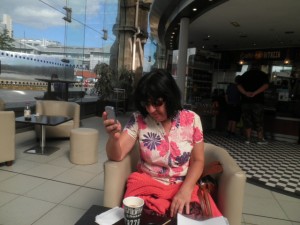
Amparo Arrospide (Argentina) is a Spanish poet and translator. She has published four poetry collections, Mosaicos bajo la hiedra, Alucinación en dos actos y algunos poemas, Pañuelos de usar y tirar and Presencia en el Misterio as well as poems, short stories and articles on literary and film criticism in anthologies and both national and foreign magazines. She has received numerous awards. Together with Robin Ouzman Hislop, she worked as co-editor of Poetry Life and Times, an E-zine.
